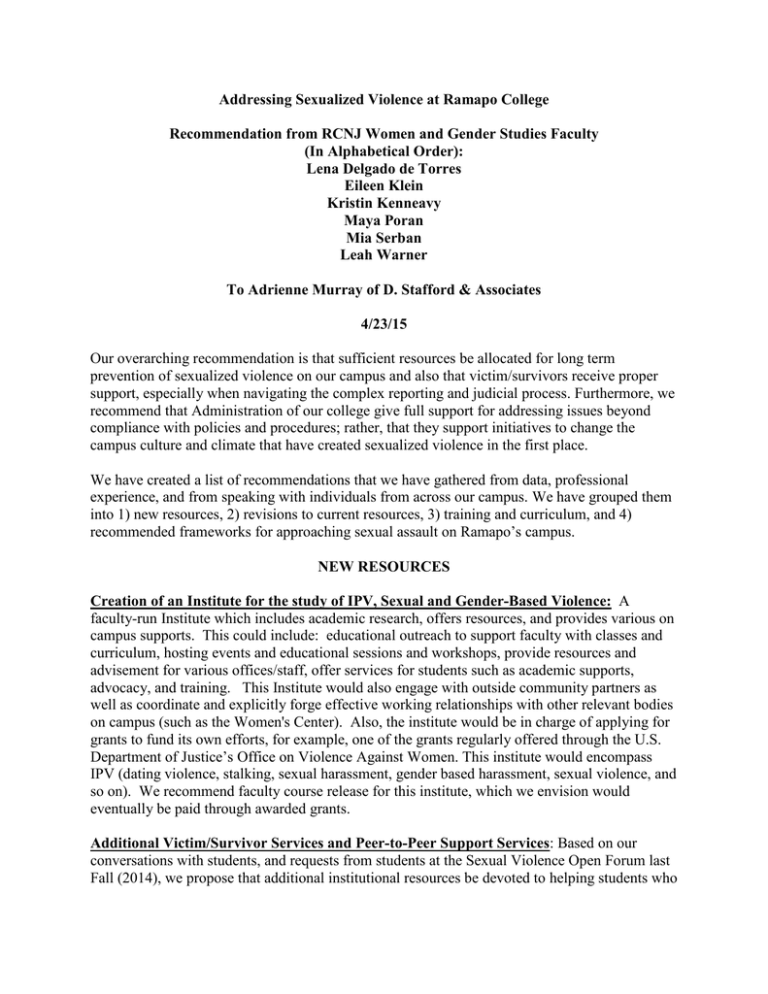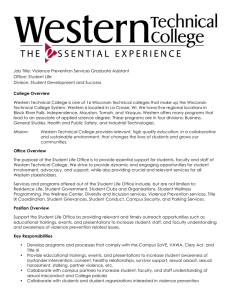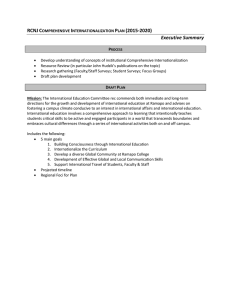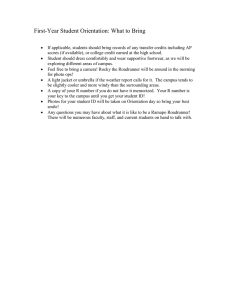
Addressing Sexualized Violence at Ramapo College
Recommendation from RCNJ Women and Gender Studies Faculty
(In Alphabetical Order):
Lena Delgado de Torres
Eileen Klein
Kristin Kenneavy
Maya Poran
Mia Serban
Leah Warner
To Adrienne Murray of D. Stafford & Associates
4/23/15
Our overarching recommendation is that sufficient resources be allocated for long term
prevention of sexualized violence on our campus and also that victim/survivors receive proper
support, especially when navigating the complex reporting and judicial process. Furthermore, we
recommend that Administration of our college give full support for addressing issues beyond
compliance with policies and procedures; rather, that they support initiatives to change the
campus culture and climate that have created sexualized violence in the first place.
We have created a list of recommendations that we have gathered from data, professional
experience, and from speaking with individuals from across our campus. We have grouped them
into 1) new resources, 2) revisions to current resources, 3) training and curriculum, and 4)
recommended frameworks for approaching sexual assault on Ramapo’s campus.
NEW RESOURCES
Creation of an Institute for the study of IPV, Sexual and Gender-Based Violence: A
faculty-run Institute which includes academic research, offers resources, and provides various on
campus supports. This could include: educational outreach to support faculty with classes and
curriculum, hosting events and educational sessions and workshops, provide resources and
advisement for various offices/staff, offer services for students such as academic supports,
advocacy, and training. This Institute would also engage with outside community partners as
well as coordinate and explicitly forge effective working relationships with other relevant bodies
on campus (such as the Women's Center). Also, the institute would be in charge of applying for
grants to fund its own efforts, for example, one of the grants regularly offered through the U.S.
Department of Justice’s Office on Violence Against Women. This institute would encompass
IPV (dating violence, stalking, sexual harassment, gender based harassment, sexual violence, and
so on). We recommend faculty course release for this institute, which we envision would
eventually be paid through awarded grants.
Additional Victim/Survivor Services and Peer-to-Peer Support Services: Based on our
conversations with students, and requests from students at the Sexual Violence Open Forum last
Fall (2014), we propose that additional institutional resources be devoted to helping students who
have experiences interpersonal violence (IPV): sexual assault or coercion, stalking, and partner
violence. In particular, we assert that group support be available for victim/survivors on campus.
This support should focus on the specific needs of different victim/survivor groups; for example,
LGBTQ victim/survivors often report greater difficulty in continuing their education relative to
other survivors, in part due to the amplifying effects of heterosexism in contributing to trauma
and barriers to services. We also suggest that we utilize the 40-hour training in sexual assault
advocacy available through our community partner, HealingSPACE, as a vehicle to prepare
students to interact with their peers as resources. Trained students could staff a 24/7 hotline on
campus that would allow survivors to talk to a peer if they are assaulted and want support. Other
institutions such as Bard College have extremely successful models that we could emulate.
Students also expressed interest in having more information on consent, more types of
collaborative trainings on sexual assault and consent, and more information on bystander
intervention (perhaps a workshop).
Victim/Survivor Advocate: An experience we have seen repeatedly is that victim/survivors
have difficulty navigating the reporting and judicial process, and we recommend that better
structures are in place for advocates to help facilitate the process. The experience of trauma often
results in difficulty attending to, encoding, and retrieving information from memory. The
victim/survivor is given a lot of information regarding their rights, the judicial process, etc., by
several different people, including officials in positions of authority that might be intimidating.
As a result of these factors, victim/survivors have difficulty understanding the information, even
if the officials have taken great care to explain themselves clearly. Students are informed that
they have a right to have someone with them at the various stages of reporting and disciplinary
proceedings, but this is not enough. Victim/survivors do not always realize at the outset just how
important it is to have someone to help them sift through everything, and they do not necessarily
have someone to help them. This issue concerns not only gender, but also social class – how the
lack of access to a lawyer and lack of contacts with people who understand the unique
disciplinary system in universities (e.g., if the student is the first in the family to go to college)
contribute to victim/survivors being inadequately represented. We recommend that every
victim/survivor be paired with a trained advocate. If this is not legally possible, then those
involved in all proceedings need to emphasize as much as possible that a friend or family
member be present, and also they need to be clear what the family/friend can and cannot say or
do during the proceedings, so as this person can best help the victim/survivor.
School-Wide Operator: We propose a position of "telephone operator." Someone who can
direct calls to appropriate offices. Faculty, staff ,and students have communicated that they find
it difficult to locate resources on campus and often do not know where to direct an inquiry. This
can be beneficial for creating a climate that is welcoming and supportive, a community and its
resources that are fully accessible, and needs both mundane and significant to be met. This
clearly includes issues of sexual violence, gender based support, and others.
REVISIONS TO CURRENT RESOURCES
Expand It’s On Us Campaign: The Women’s Center and Counseling Services recently
coordinated the launch of the “It’s on Us” campaign at Ramapo College. This included the
creation of a public service announcement video. It is a White House initiative that features a
pledge that students can sign.
It’s on us:
To RECOGNIZE that non-consensual sex is sexual assault.
To IDENTIFY situations in which sexual assault may occur.
To INTERVENE in situations where consent has not or cannot be given.
To CREATE an environment in which sexual assault is unacceptable and survivors are
supported.
We propose further support for this campaign so that it becomes a recognizable message on
campus. Extensions could include a social marketing piece that would include attention-grabbing
posters that feature actual Ramapo College students who represent a variety of constituencies
(sports, SGA, etc…) The posters could reiterate many of the above points, but would pull in data
about Ramapo College students and could feature images that are specific to the campus. We
propose that this be a student-led effort and could incorporate the knowledge of faculty who
teach marketing. Expanding It’s On Us could allow us to send a variety of messages within a
consistent theme that would prevent competition among messages derived from various
programs (affirmative consent, bystander intervention, etc…)
Reform The Behavioral Intervention Team: Currently, the Behavioral Intervention Team
(BIT) coordinates the support services of Ramapo College in order to assist students who have
reportedly displayed troublesome or concerning behaviors on campus
(http://www.ramapo.edu/bit/). BIT serves as a central network, conduit through which to alert
campus authorities of worry and concern for a student. While BIT assists these students, it does
not serve as a crisis response unit, nor is it particularly responsive to what it perceives to be
“classroom management” issues (for example, when a student is afraid to leave their house and
come to class). It is a good first line of intervention, but it is relatively little known on campus,
and it is unclear how effective or helpful it has been. There are no BIT reports publicly available
to the community. BIT’s current membership is administration only (the Dean of SSHS is the
only faculty member, but serves in his administrative capacity). We recommend the following
reforms:
• Broaden BIT’s responsibilities and powers to serve as a resource for the entire campus,
not just students;
• Add faculty members to the team, which would make BIT more aware of the needs of
both students and faculty;
• Increase BIT’s transparency and communication, for example by making sure there is
follow-up to referrals in practice, and that BIT publishes annual reports that allow the
campus to identify patterns, learn, reflect, and make changes.
Review Disciplinary Procedures: While the College has in place mechanisms for ensuring that
it follows federal mandates (e.g. the Title IX Committee), we are concerned with some gaps that
we noted from the bottom up. We’d like to recommend a campus-wide discussion on our
disciplinary procedures and the extent to which they are appropriate for campus sexual assault,
domestic violence, dating violence, and stalking, for example by making sure that victims are
always present during the proceedings. This partly dovetails with our proposal about campus-
wide trainings, but it is a broader request to include faculty, staff, and students in the current
conversation. We recommend that a mechanism is created for faculty to be informed if one of
their students is accused (and in particular if the victim is in the same class or major), and that
the College creates some options for faculty to deal with the situation (e.g. an “administrative
incomplete” or similar grading mechanism, as currently faculty cannot give an I or W grade
without the prior request of the student).
Changes to the Ramapo.edu Website and Other Internet-Based Services: We recommend
the creation of a one-stop link on the Ramapo intranet for all campus resources related to sexual
assault, domestic violence, dating violence, and stalking. Ideally, we would also recommend that
we create an app (similar to Alert Me Now) for our students that would direct them to these
resources.
Changes to Campus Guide Signs in Bathrooms: Presently there are wordy signs in the
bathrooms indicating where one should go to for assistance for various problems. It is suggested
that a sign be made specifically regarding sexual assault and related issues, and that this sign is
posted prominently in bathrooms and other areas.
Multiple Doses of Messaging and Training: It is a well-documented and widely accepted
mandate (emanating from the Centers for Disease Control and Prevention - see citation below)
that individuals need to receive 7-9 doses of messaging and training around sexual assault
prevention to fully realize the benefits of such efforts. Ramapo College needs to continue to
require that students continue to interact with pro-social messages past their first-year
experience. Furthermore, we assert that the College become familiar with the recommendations
listed below for Rape Education Programs. However, we do not suggest that this model be used
to the exclusion of other social-justice oriented approaches.
10 Principles of Effective Prevention Programs/Strategies 1
CDC is utilizing the following principles to design and implement RPE (Rape Prevention
Education) programs and strategies.
1. Comprehensive: strategies address risk and protective factors for sexual violence at multiple
levels of the Ecological Model or Spectrum of Prevention.
2. Varied teaching methods: multiple strategies that increase awareness and understanding as
well as enhance and build new skills.
3. Sufficient dosage: exposure to enough of the intervention to produce the desired effect (i.e.
multiple sessions). Research shows that 7-9 “doses” are needed to affect changes in attitudes
and behaviors.
1
Nation M; Crusto C; Wandersman A; Kumpfer KL; Seybolt D; Morrissey-Kane E; Davino K. What
Works in Prevention: Principles of Effective Prevention Programs. American Psychologist. 58(6-7); JunJul 2003:449-456.
4. Theory driven: strategies that have a scientific justification or logical rationale for why they
should work.
5. Positive relationships: strategies that promote strong positive relationships between
children/youth and adults, youth to youth, and adult to adult.
6. Appropriately timed: strategies are initiated early enough and at the appropriate
developmental time to have an impact on the development of positive and negative
behaviors.
7. Socioculturally relevant: tailored to the community and cultural norms, beliefs and practices;
inclusion of community representatives in planning and implementation phases.
8. Outcome evaluation: systematic measurements that can document how well the intervention
works.
9. Well-trained staff: programs are implemented by staff that are sensitive, competent, and
sufficiently trained, supported, and supervised.
10. Evidence-based: efforts that are informed by the best available research or expertise.
TRAINING AND CURRICULUM
Training for Public Safety: Based on vigorous qualitative analysis of data from the Green Dot
surveys, results indicate that 1 out of 10 students stated that they did not feel comfortable going
to public safety and/or that public safety was perceived as not competent at addressing their
concerns. Further anecdotal evidence from multiple student and faculty sources also indicate
that the staff would benefit from training which centers on how to interact with those disclosing
their experience of a crime committed against them. Special attention should be give to train
members of Public Safety on Post Traumatic Stress and memory/forgetting, and how to
expressly support a person coming to their office for assistance. In addition, training regarding
gender, sexuality, and other stigmatized group identity related experiences should be
included. This training should be in-person and mandatory.
Training for Faculty: Many faculty have publicly expressed their desire for training in regard to
violence and how to best support students. In addition to basic policy and procedure, it is
suggested to train faculty in the basics of gender inequity and sexual violence, IPV, reporting,
PTSD, etc. Students have also expressed a need for faculty to undergo sensitivity training for
interacting with students who experienced sexualized violence, other traumas, and/or experience
chronic conditions. This training should be in-person and mandatory.
Curriculum: Social Issues Course: Currently, all Ramapo students are required to take a Social
Issues course (or, in the case of The Anisfield School of Business, the Business Perspectives
course). Social Issues examines the major social issues and problems facing modern society. It
focuses on contemporary issues of power and inequality that center on divisions of social class,
race, and gender. This course is one opportunity to reach students from across campus to discuss
social inequality. We recommend that all instructors include sexualized violence as a topic in the
syllabus. Separately, we recommend that The College preserve the substance of this course as
we transition to a new General Education curriculum. So far, the General Education Task Force
has recommended transforming the course into “Social Sciences Inquiry.” Since the specific
content of this course is still open for discussion, we see this as an opportunity to better infuse
issues regarding sexualized violence into the curriculum. NOTE: A copy of a current Social
Issues syllabus should already be on file.
FRAMEWORKS FOR APPROACHING SEXUAL ASSAULT ON RAMAPO’S CAMPUS
Taking a Holistic Approach to Assessing The Victim’s Interactions with The Institution:
We recommend that, as The College considers plans to address sexualized violence on campus,
that a holistic approach is taken to understanding the victim’s interactions with the institution.
We have heard of many cases of students who have experienced problems at each step in the
process: from initial reports, to disciplinary hearings and interacting with faculty in their classes.
Individual problems become egregious when all are considered holistically. We are concerned
that when individual offices see a minor issue with their treatment of a victim/survivor, that they
view it as a non-issue, or at least not enough of an issue to address it. This “siloed” approach
fails to understand how minor issues at each step of the way lead a survivor/victim to feel
seriously traumatized by the institution as a whole. This holistic approach links to several of our
other recommendations, such as the IPV institute and providing a victim’s advocate during the
reporting process.
Empathy and Attachment: We recognize that a variety of problems at the College are related.
In particular, we have seen some egregious instances of sexism and racism in the actions of a
number of students. We hypothesize that one of the reasons for this is a lack of attachment and
empathy among students, fostered by weak community cohesion. The CDC identifies empathy
and attachment as protective factors that help to prevent sexual assault.
http://www.cdc.gov/violenceprevention/sexualviolence/riskprotectivefactors.html
Protective Factors for Perpetration
Protective factors may lessen the likelihood of sexual violence victimization or perpetration by
buffering against risk. These factors can exist at individual, relational, community, and societal
levels. The few protective factors identified by researchers to date are listed below. Research in
this area is ongoing.
•
Parental use of reasoning to resolve family conflict
•
Emotional health and connectedness
•
Academic achievement
•
Empathy and concern for how one’s actions affect others
We would like the College to review the literature on this and formulate interventions among
students that would foster empathy and attachment as a preventative strategy.
Links to Issues Facing Other Stigmatized Groups on Campus: We recommend that, as
members of The College consider long term plans to address sexualized violence, that they
acknowledge the links to a larger campus climate of aggression and hostility towards social
groups on campus. There has been much backlash against students of color and allies that have
been protesting police brutality. It is not coincidence that this year Ramapo has also been
confronted with hostility and harassment on social media. It is important for us to acknowledge
how the issue of sexual assault connects to the climate for students of color, LGBTQ students,
first generation college students, low SES students, and other stigmatized groups on campus, and
the lack of resources available for them.




